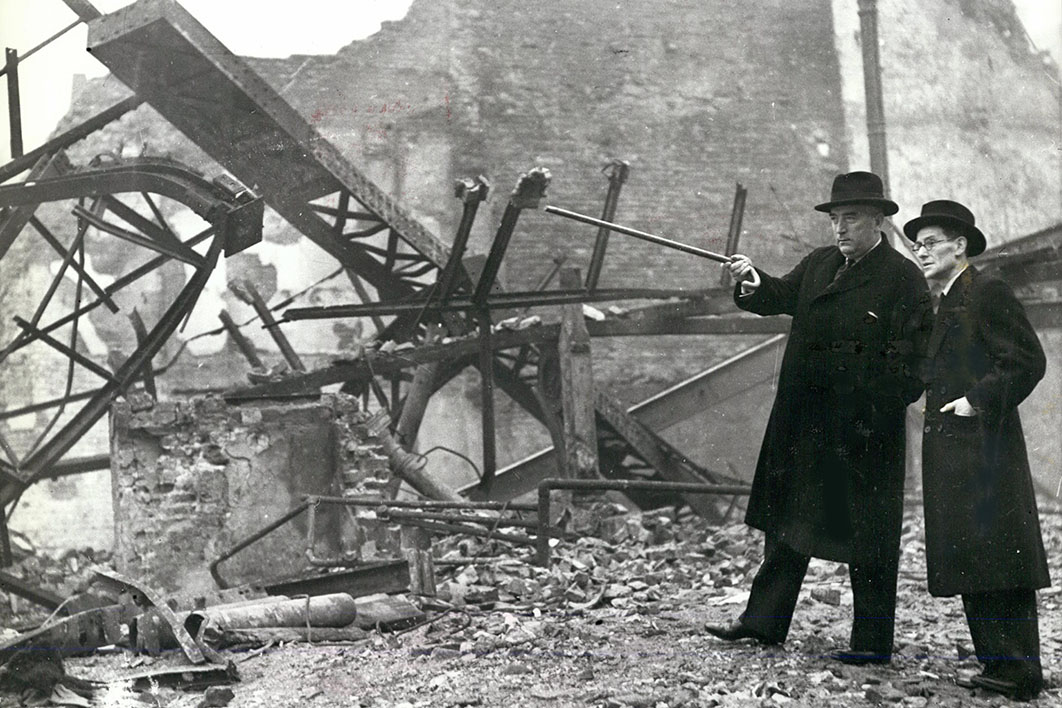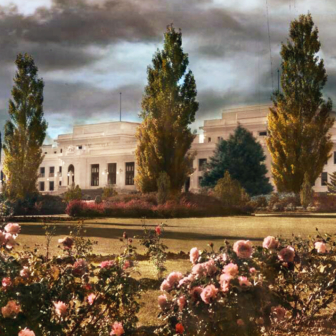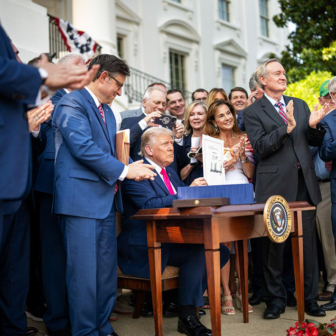The biggest national crises of the period since Federation wrought havoc on Australia’s political system, tearing parties asunder and destroying prime ministerships. Often they brought to the surface longstanding tensions, inflaming already tenuous alliances and exposing fragile leaderships. Does Australia’s experience of the three biggest upheavals — two wars and the Great Depression — give any guide to the political impact of the current crisis?
Andrew Fisher and his Labor colleagues returned to government just a few weeks after the outbreak of war in August 1914. The conflict in Europe was the first great crisis to face the new Commonwealth and would generate conflicts that eventually split Labor and ended Fisher’s third period as prime minister.
Outwardly calm, the cautious Scotland-born Fisher was far from jubilant when he replaced the inept Liberal government of Joseph Cook, which had governed for just fourteen months. He was troubled not just by the conflict but also by the need to balance war aims with the Labor Party’s cherished social goals.
Tensions had already emerged over attitudes to the war. Early in the campaign Fisher had clashed with Billy Hughes, who wanted the election called off. “I am absolutely in disagreement with your views,” was Fisher’s curt response. In the faultlines opened by this exchange were the seeds not just of Fisher’s imminent political demise but also of the calamitous schism that was soon to engulf and all but destroy the Labor Party.
The changed mood was apparent when the enlarged Labor caucus gathered two days after the election to elect the ministry, a process so protracted and fiercely contested that the governor-general was kept waiting for almost seven hours until the composition was decided. While there was broad agreement between Fisher and Cook on Australia’s commitment, with Fisher famously pledging to support Britain “to the last man and the last shilling,” widely divergent views existed within caucus.
Ardent pro-imperialists like Hughes, who favoured conscription, harried Fisher from the right, while those wary of imperial war aims and opposed to conscription pressed him from the left. The broad consensus that had solidly underpinned Fisher’s leadership and his previous two terms as prime minister was fracturing, fuelling the intolerable strain of having simultaneously to run a country, conduct a war and preside over a party itself descending into internecine chaos. In cabinet, relations between Fisher and Hughes grew more tense, at least partly because of the peculiarly apocalyptic view the abrasive Hughes took of the war and his apparent doubts about Fisher’s capacity to mobilise the nation.
By the time parliament adjourned for the recess in December, Fisher was worn down and in need of a break. He departed for New Zealand, ostensibly on official business but actually in search of recuperation amid growing concern about his health, and possibly even the early signs of the dementia that was to cloud the last years of his life. The press reported that he “will probably be absent for a month.” Hughes would be acting in his absence. The event passed without comment in the newspapers, absorbed as they were in the war coverage.
Pressures on Fisher continued to multiply after his return. Differing attitudes to both the war and Australia’s response sharpened in 1915, especially after the formation of a new pressure group, the Universal Service League, which advocated the introduction of conscription for overseas service. This opened up a new front for Fisher, with the opposition also agitating for conscription, to which he was strongly opposed. Some members of his caucus didn’t share his opposition, however, and he had clashed with Hughes as long ago as 1903 over the issue.
Adding to the prime ministerial burdens was the news of the disastrous campaign in the Dardanelles and the impact of the heavy Australian casualties. In June, caucus erupted into open hostilities in response to wider unrest in the labour movement. Wartime economic problems occupied much of Fisher’s attention (he was also treasurer) as he sought funds for the war effort. The mounting strains wore away at what he referred to as a “vile invisible enemy”: his fragile health.
Seeking to rid himself of one major irritant, he offered Hughes the job of high commissioner in London; Hughes declined, so Fisher took the job himself and resigned the prime ministership. Succeeded as leader by Hughes, he watched from afar as his nemesis split the Labor Party, taking with him some of the best and brightest to form what he termed a National Labor government, and later merging with the opposition Liberals to form the Nationalist Party. The split kept Labor out of office for more than a decade.
Labor’s return from the wilderness in 1929, under James Scullin, unhappily coincided with the second major crisis, the Great Depression. Scullin assumed the prime ministership the same week that the calamitous Wall Street crash triggered a global economic earthquake. As an observer at the time noted, no ministry had ever taken office under less auspicious circumstances.
Economically literate and politically astute, the diligent Scullin was under no illusions about the significance of the crisis. Nor was he short of advice; indeed, a cacophony rang in his ears, much of it conflicting. But his capacity to act was severely constrained by a range of factors including a hostile Senate, the intransigence of the Commonwealth Bank board, antipathy towards his government among conservative state governments and business interests, serious divisions within his government, and a wider civil war beginning to engulf the Labor Party.
The fortunes of the Labor Party, to which Scullin had devoted so much of his life, were inextricably bound up with his prime ministerial fortunes. Standing firm after the fragmentation of Stanley Melbourne Bruce’s Nationalist government, the new Labor administration at first looked dependable and solid, as did the new prime minister. But as cracks appeared and started to widen, the prime minister seemed increasingly impotent. Assailed by forces from without and within, his political existence was quickly reduced to a frantic struggle for survival.
The highly competent former Queensland premier Ted Theodore had been forced to stand down as Scullin’s treasurer while an investigation was conducted into his business affairs. In New South Wales, the powerful Labor leader Jack Lang was exerting growing control over the party at both state and federal level. By mid 1931, the Scullin–Theodore group could count on only thirty-five formal followers in a House of Representatives of seventy-five, and many of these were in rebellion against particular measures to deal with the economic crisis. Some measures were passed only with the help of the opposition.
For all his abilities, Scullin was never able to control or contain the forces unleashed. Eventually, key figures left the party, among them Joe Lyons, who subsequently defected to the Nationalists to form the United Australia Party. It was under Lyons that the UAP won government at the end of 1931, just as the situation in Germany was beginning to look threatening.
Robert Menzies had only just succeeded to the leadership of the UAP, and prime ministership, when war broke out. Lyons had died in 1939 and Country Party leader Earle Page had briefly taken the reins while seeking to block Menzies’s accession. Menzies faced his first election in 1940, with the war still confined to Europe, and the result was a hung parliament with the balance of power held by two independents who supported the UAP.
The UAP had never been a stable formation, and it was riven by personal and ideological differences. A lingering antipathy towards the sometimes-abrasive Menzies, especially from Sydney, continued to smoulder. On a protracted visit to London, he was ruthlessly undermined, eventually resigning after his return.
But Menzies had done much work to prepare the nation — “precious work,” in the words of official war historian Paul Hasluck. By the time the war spread to the Far East, wrote Hasluck, “many of the initial difficulties and most of the routine tasks organising a nation for war had already been mastered.”
Country Party leader Arthur Fadden occupied the prime minister’s office for just six weeks before the two independents, unhappy at the way Menzies had been treated, crossed the floor and enabled Labor’s John Curtin to take the helm, arguing that he alone could deliver the stability needed to continue the war effort.
In 1943, the Australian people gave Curtin and Labor a ringing endorsement at the polls. The UAP, reduced to a mere fourteen seats, soon disintegrated, and Curtin led the nation through most of the war, establishing himself as Australia’s greatest leader.
The current crisis has yet to claim a political victim. In the short term, indeed, it has provided an opportunity for a hitherto undistinguished leader, a man who came to power through a combination of guile and luck, to imprint himself on the national psyche.
After an almost disastrous false start over the bushfires, Scott Morrison has begun to emerge as the level-headed suburban voice of calm, happy to defer to the experts and willing to work collaboratively with all sides of politics. Unlike Fisher, Scullin and Menzies, he has what appears to be a united party behind him. There is no Billy Hughes snapping at his heels, no Jack Lang ranged against him, no serious undermining of his position from within. His only possible opponent, Peter Dutton, is effectively sidelined.
His reaching out to the states and territories in the form of the national cabinet has displayed an imaginative pragmatism that transcends the political divide and provides him with a team far more talented than the generally lacklustre ministry he heads in Canberra.
Early days yet, to be sure. But for the time being, Scott Morrison appears to be avoiding the storms that engulfed those crisis-era leaders before him. •




